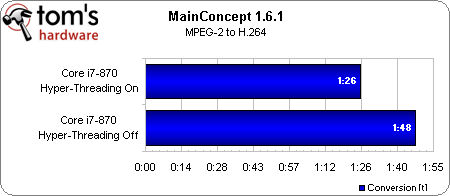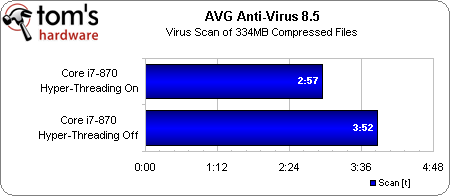Intel Core i5 And Core i7: Intel’s Mainstream Magnum Opus
Hyper-Threading: Differentiating Core i7
So now we have Core i7-800s on LGA 1156 and Core i7-900s on LGA 1366. Confusing, yes. But I’ve tried to make it clear here, at least, that what makes an i7 an i7 is its inclusion of Hyper-Threading technology. Indeed, Intel also uses clock rate as a differentiator, and at least in theory you should get more Turbo Boost from an i7-800-series CPU than an i5 as well.
As you probably already know, Hyper-Threading is Intel’s simultaneous multi-threading technology that presents each physical core as two logical cores to an operating system. Thus, when you open the Task Manager on a Hyper-Threading-enabled Nehalem-based CPU, you see eight threads. This doesn’t mean you suddenly have the equivalent of an eight-core processor. Instead, Intel duplicates certain resources in each physical core to make the technology available; it’s better to think of Hyper-Threading as allowing the execution resources on a quad-core i7 to be better-utilized in threaded workloads.
We know that MainConcept Reference, for example, is well-threaded. By simply turning Hyper-Threading on, our transcoding workload falls from 1:48 to 1:26.
Similarly, the latest version of AVG’s anti-virus software realizes a massive gain thanks to Hyper-Threading. Less-optimized or simply multi-tasked environments will yield less-pronounced results, but there certainly seems to be a reason to at least consider a Core i7 if you’re able to benefit from what Hyper-Threading offers.
Get Tom's Hardware's best news and in-depth reviews, straight to your inbox.
Current page: Hyper-Threading: Differentiating Core i7
Prev Page Intel’s Turbo Boost: Lynnfield Gets Afterburners Next Page Memory Architecture: Does Losing One Channel Hurt?-
caamsa Dang! AMD better get their $4iT together. Now I need to decided between i7, i5 or phenom II when I do my next upgrade........technology happens too fast. Looking forward to more reviews on the i5 and mb prices.Reply -
People need to be careful when comparing the i7-870 to a i7-920, alot of people pre-release were worried that the 1156 platform was going to dominate the 1366. However when you see the 870 out perform the 920 people need to remember that a 870 is double the price of a 920, and even when you factor in a motherboard a 920 setup comes out cheaper than a 870.Reply
Now the i5 750 on the other hand is great performance at a great price, and would certainly be the budget gamers new weapon of choice.
I currently have an i7-920 setup which is my main rig and am very happy with it and not at all upset to the see the 870 outperform it (since the 870 would cost me twice as much). I also have had an i5 750 setup now for over a week (the 1156 processors and motherboards have been available here in Australia for nearly 2 weeks now) and it is an amazing processor for the price of it.
So what am I trying to say? 1366 is still a good platform for the top end of the market. The i5 are fantastic new processors for their price, and the 1156 i7's are just confusing and I'm not really sure who they are going to appeal to? I could understand it if Intel launched the 1156 i7's in 6months time when alot of users are already using the 1156 platform and are looking to upgrade their CPU without a new mobo. But to anyone looking at getting a 870, just get an 920 and use the extra cash on the mobo and ram to go with it. -
Nintendork A little confusing the charts.Reply
I would prefer a bench with HD4890. They scale better in CF. -
cabose369 Intel needs to come up with a simplified naming system for their products. They are as bad as NVIDIA is right now in terms of naming their products.Reply
There is sooo much to learn and there is so much information here.... I feel confused!! -
alikum Well, I just hope that the Core 2 Quads will drop in prices significantly so that I could grab the high-end one for my final LGA775 upgrade!Reply -
buzznut Well this is good news for consumers. I'm not certain why it took so long for Intel to make some mainstream proc like i5, but for intel fans it seems worth the wait.Reply
This will also compel AMD to bring some more value to the market. Nice article. -
jawshoeaw damn, 150 watts at idle?? Is that just the cpu? I hope the gaming rigs built on these processors are not left on 24/7. My old AMD X2 3800 system including the monitor uses less than 150 watts at idle (50 of which is the 22" LCD).Reply -
unclewebb i7 Turbo is a good tool to monitor the multiplier of Core i5/i7 CPUs.Reply
http://www.fileden.com/files/2008/3/3/1794507/Turbo.zip
It uses the method that Intel recommends in their November 2008 Turbo White Paper. -
evolve60 "Intel Core i7-920 Extreme (Bloomfield) 2.66 GHz, LGA 1366, 4.8 GT/s QPI, 8 MB L3, Power-savings enabled"Reply
Since when has the I7-920 become an extreme?


